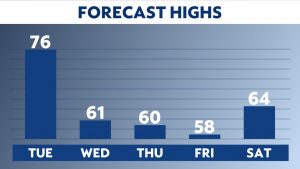CLEVELAND — A recent poll from the American Psychological Association found that 68% of voting age adults say the upcoming U.S. election is a source of significant stress.
That number is up from 52% in 2016.
Cleveland Clinic Psychologist Dr. Susan Albers says theres even a psychological term for the spike in stress and anxiety.
“In 2016, a therapist coined the term ‘Election Stress Disorder’ and this therapist termed this because he noticed a great number of his clients coming in with a spike in reporting feeling anxious, angry and stressed by the elections. So, this may sound familiar to people—that right now, they are experiencing a large range of emotions, everything from feeling dread about the future, despair and sometimes even disgust. A lot of the physical reactions that people are having are around insomnia, headaches, stomach issues anything that is a stress-related response,” said Albers.
“Election Stress Disorder” isn’t something that can be clinically diagnosed, but a lot of people resonate with it.
Albers says there are things you can do to reduce those stress symptoms. First, it’s important to know your emotional hot buttons: Those issues that are particularly triggering. She says owning and acknowledging those can be helpful in reducing stress response.
“It is important to speak up, to be an advocate to express (yourself),” Albers said, “We want to pick people who are open to those discussions. And if a discussion is not going in a positive way, it’s OK to opt out of it. Change the subject. We have holidays coming up, so really be prepared what to do in the event that some of these triggering discussions are going to pop up.”
Albers suggests to be mindful about the media you are consuming.
“It’s less about what you say (and) it’s more about how you say it. So, finding media sources that give you facts instead of feelings can really help you to inform your opinion and make your own opinion that isn’t based on emotion, but really on the facts that are out there.”
She says you can do some self-soothing activities like yoga and deep breathing or just taking a break, and of course, you can do your part.
“One of the things that can be helpful for reducing your stress level is to go vote. Go vote early, and that way you get it off your plate, and you don’t have to worry about it. And so, you feel like good about that you have done your part.”




